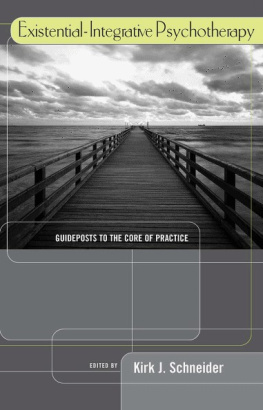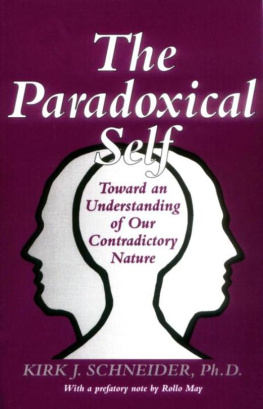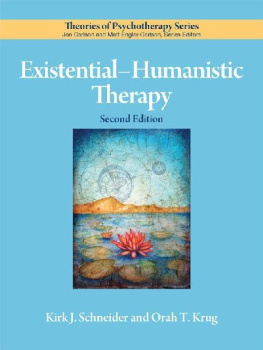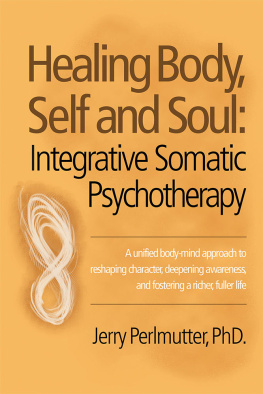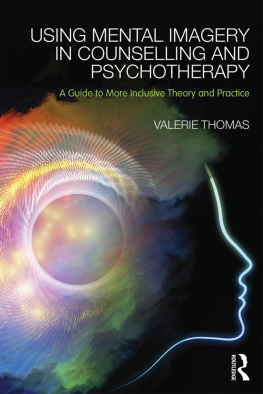Kirk J. Schneider - Existential-Integrative Psychotherapy: Guideposts to the Core of Practice
Here you can read online Kirk J. Schneider - Existential-Integrative Psychotherapy: Guideposts to the Core of Practice full text of the book (entire story) in english for free. Download pdf and epub, get meaning, cover and reviews about this ebook. year: 2011, publisher: Taylor and Francis, genre: Romance novel. Description of the work, (preface) as well as reviews are available. Best literature library LitArk.com created for fans of good reading and offers a wide selection of genres:
Romance novel
Science fiction
Adventure
Detective
Science
History
Home and family
Prose
Art
Politics
Computer
Non-fiction
Religion
Business
Children
Humor
Choose a favorite category and find really read worthwhile books. Enjoy immersion in the world of imagination, feel the emotions of the characters or learn something new for yourself, make an fascinating discovery.
- Book:Existential-Integrative Psychotherapy: Guideposts to the Core of Practice
- Author:
- Publisher:Taylor and Francis
- Genre:
- Year:2011
- Rating:4 / 5
- Favourites:Add to favourites
- Your mark:
- 80
- 1
- 2
- 3
- 4
- 5
Existential-Integrative Psychotherapy: Guideposts to the Core of Practice: summary, description and annotation
We offer to read an annotation, description, summary or preface (depends on what the author of the book "Existential-Integrative Psychotherapy: Guideposts to the Core of Practice" wrote himself). If you haven't found the necessary information about the book — write in the comments, we will try to find it.
Existential-Integrative Psychotherapy: Guideposts to the Core of Practice — read online for free the complete book (whole text) full work
Below is the text of the book, divided by pages. System saving the place of the last page read, allows you to conveniently read the book "Existential-Integrative Psychotherapy: Guideposts to the Core of Practice" online for free, without having to search again every time where you left off. Put a bookmark, and you can go to the page where you finished reading at any time.
Font size:
Interval:
Bookmark:

Existential-Integrative Psychotherapy
GUIDEPOSTS TO THE CORE OF PRACTICE
EDITED BY
Kirk J. Schneider

NEW YORK LONDON
Routledge
Taylor & Francis Group
270 Madison Avenue
New York, NY 10016
Routledge
Taylor & Francis Group
2 Park Square
Milton Park, Abingdon
Oxon OX14 4RN
2008 by Taylor & Francis Group, LLC
Routledge is an imprint of Taylor & Francis Group, an Informa business
This edition published in the Taylor & Francis e-Library, 2010.
To purchase your own copy of this or any of Taylor & Francis or Routledges collection of thousands of eBooks please go to www.eBookstore.tandf.co.uk.
ISBN 0-203-94111-X Master e-book ISBN
International Standard Book Number-13:978-0-415-95471-6 (Hardcover)
No part of this book may be reprinted, reproduced, transmitted, or utilized in any form by any electronic,
mechanical, or other means, now known or hereafter invented, including photocopying, microfilming,
and recording, or in any information storage or retrieval system, without written permission from the
publishers.
Trademark Notice: Product or corporate names may be trademarks or registered trademarks, and are
used only for identification and explanation without intent to infringe.
Library of Congress Cataloging-in-Publication Data
Existential-integrative psychotherapy : guideposts to the core of practice / edited by
Kirk J. Schneider.
p. ; cm.
Includes bibliographical references.
ISBN-13:978-0-415-95471-6 (alk. paper)
ISBN-10:0-415-95471-1 (alk. paper)
1. Existential psychotherapy. 2. Integrative psychotherapy. I. Schneider, Kirk J.
[DNLM: 1. Psychotherapy--methods. 2. Existentialism. WM 420 E95m 2007]
RC489.E93E95 2007
616.8914--dc22 2007007149
Visit the Taylor & Francis Web site at
http://www.taylorandfrancis.com
and the Routledge Web site at
http://www.routledge.com
Copyright 2010 Mobipocket.com. All rights reserved.
Reader's Guide
This ebook has been optimized for MobiPocket PDA.
Tables may have been presented to accommodate this Device's Limitations.
Table content may have been removed due to this Device's Limitations.
Image presentation is limited by this Device's Screen resolution.
All possible language characters have been included within the Font handling ability of this Device.
KIRK J. SCHNEIDER
ANN BASSETT-SHORT AND GLENN A. HAMMEL
LILLIAN COMAS-DAZ
DONADRIAN L. RICE
ROYAL ALSUP
LAURA S. BROWN
JOAN MONHEIT
ILENE SERLIN
JAMES F. T. BUGENTA
JOHN GALVIN
BARBARA BALLINGER, ROBERT A. MATANO, AND ADRIANNE C. AMANTEA
LOUIS HOFFMAN
BARRY E. WOLFE
KARA BUNTING AND STEVEN C. HAYES
DANIEL DORMAN
ED MENDELOWITZ
DENNIS PORTNOY
ROBERT D. STOLOROW
DIANA FOSHA
STEPHEN CURTIN
ELIZABETH K. BUGENTAL
TOM GREENING
This book opens a new chapter in existential-mainstream collaborations on practice. Drawing on the foundations of my original existential-integrative text, The Psychology of Existence, co-authored with the late Rollo May (1995), this book advances the therapeutic conversation to a new generation of students and practitioners. This is a generation that has witnessed the ascendancy and subsequent dilution of influence by the managed care and standardization movements in psychology, and a parallel rise in new, more diversified practices. While these practices do not yet dominate the therapeutic landscape, they are increasing in salience, as this book attests.
This book, accordingly, represents both an update and expansion on the clinical chapters in The Psychology of Existence; it also signals an urgent plea. It is a plea to the psychotherapy community to wake up and recognize existential dimensions of diversified practices; for without the existentialthe understanding of a persons relation to beingsuch practices too often devolve into adjustment rituals, rarified or removed strategems, that quell but do not necessarily transform. This book, then, is a repositoryboth impassioned and broadof existential dimensions of diverse practices. These dimensions are applied to a remarkable array of approaches, theories, and clinical populations, and they demonstrate, convincingly, in my view, that existential-mainstream collaboration is not only desirable, but imperative, if we are to advance the cause of whole and substantive transformation of lives. Among the domains that are addressed in this text are existential-integrative practices with racial and ethnic minorities, gays and lesbians, single women, children, clients with severe disturbances, older persons, alcoholics, phobic clients, and clients who are dying. Equally, the book illustrates the compatibility of existential sensibilities with a variety of ostensibly contrasting theoretical orientations. These include the integration of existential practices with cognitive-behavioral, psychoanalytic, religious, and even short-term orientations and interventions.
In sum, this book accentuates the value of an existential attitude across cultures, diagnoses, and orientations. To the extent that students develop this attitude, they will be worthier and more complete facilitators. What is this attitude that bolsters so much of the core of what we practitioners prize? It is presencedeep, abiding, and emancipatoryand it is one of the avowed tragedies of our contemporary era that precisely these elements are neither nurtured nor prized in standardized training and service facilities throughout our land.
This book will illuminate the value of presence, depth, and emancipatory practices across a diversity of settings and methodologies, and it will provide to both the developing trainee and the interested practitioner step-by-step skill repertoires to guide and cultivate their ministrations. At the same time, however, this book is not simply a how-to manual designed to systematize integrative therapeutic practice. By contrast, it is a compendium of discovery that, in keeping with its existential-integrative philosophical base, provides guideposts to therapys inmost domains.
Finally, this book owes its incarnation to many caring and dedicated souls within the existential-integrative therapeutic community, but first and foremost to my great teachers, Rollo May (19091994) and James and Elizabeth Bugental. They never shrank from bold inquiry or the advocacy of bold inquiry. May was the original inspiration for this existential-integrative undertaking, and James Bugental and his remarkable wife, Elizabeth, were my hands-on facilitators in existential-integrative practice. To each, I convey my unwavering gratitude.
Second, I am indebted to the participants in this volume who sacrificed their time, energy, and even professional comfort zones to plow new fields in therapeutic theory and application. You have my enduring appreciation.
Third, I am grateful to the acquisition editor, George Zimmar, for his own daring vision, as well as commitment to this undertaking.
Kirk J. Schneider
Next pageFont size:
Interval:
Bookmark:
Similar books «Existential-Integrative Psychotherapy: Guideposts to the Core of Practice»
Look at similar books to Existential-Integrative Psychotherapy: Guideposts to the Core of Practice. We have selected literature similar in name and meaning in the hope of providing readers with more options to find new, interesting, not yet read works.
Discussion, reviews of the book Existential-Integrative Psychotherapy: Guideposts to the Core of Practice and just readers' own opinions. Leave your comments, write what you think about the work, its meaning or the main characters. Specify what exactly you liked and what you didn't like, and why you think so.

